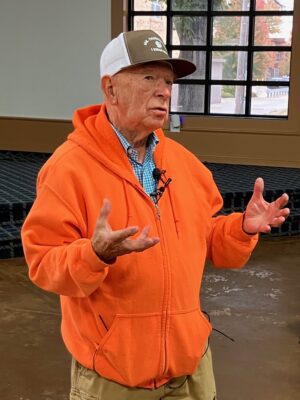Leo’s Still A Shoe Thing For Repairs In Rock Island
 Squirreled away amongst the depression-era architectural remains of downtown Rock Island, next to the shimmering strip clubs and sagging dive bars on 20th Street, scant slumping steps from the eternal river that announces the end of Illinois, is a sentinel of a bygone era that transcends time and trends.
Squirreled away amongst the depression-era architectural remains of downtown Rock Island, next to the shimmering strip clubs and sagging dive bars on 20th Street, scant slumping steps from the eternal river that announces the end of Illinois, is a sentinel of a bygone era that transcends time and trends.
Walk within its doors and you enter a cramped kingdom, a taut narrow expanse of colorful cardboard towers soaring to the stucco ceiling, monolith over a workshop bursting with stitches and steel.
A tall, thin man with ebon and silver bolts of hair and an impish grin greets you, hearty and hale, beneath a sign that winks “We Can’t Save Your Sole, But We Can Heel Your Shoes.”
“Welcome to Leo’s,” he smiles, “can I help you?”
Under an old, red-white-and-blue sign, tucked into an unassuming brick rectangle attached to a block-long burlesque house, Leo’s Shoe Repair has survived and thrived at 315 20th St. since 1927. Its founders, the Faramelli family, have been in the footwear business since the 1800s, when Andrew Faramelli traveled from village to village in his native Italy, crafting shoes by hand for modest families bursting with children.
In the early 20th century, Andrew and his family, including his infant son, Leo, crossed the expanse of earth and ocean to settle in Rock Island, staking a spot for a haven of enterprise that would survive for close to a century, through three generations, to its current owner, Leo’s son, Jim.
“Shortly after the store first opened,” Jim says, leaning on the teeming glass-and-wood counter festooned with signs and smudges that has held for decades, “the depression began, and there were grown men standing on street corners selling pencils and apples, just to get some change in their pockets. My father would tell me the trains would pull up down the street and people would line up and the government trains would bring big bags of corn and flour to break up and give to people. Just basic nourishment for people to get by.”
He looks around the shop, nodding, smiling, at the walls of parts and parcels. “This survived that,” he said. “Dad said they were busy, but people couldn’t afford to repair their shoes so he had to keep prices down to the bare minimum. But he did. And he survived.”
He survived. Wars big and small, economic explosions and implosions, the decay of downtowns and the metamorphosis of the geography around him, the city around him. Survived and thrived.
Jim came aboard as Leo’s partner in 1970, off a stint in the Navy, after graduating from Augustana in 1967 holding a degree in Business Administration. He’d been working by his father’s side since he was 12. He never really considered leaving him behind.
“I always enjoyed it,” Jim said. “When I came back, in 1970, there was a recession going on, and guys I knew were getting let go from their factory jobs. There didn’t seem to be a lot of job security, unless you owned your own business. So I decided it would be a good idea to start here. And I missed it. I’ve always liked working here. I wanted to come back.”
So he’s remained, through the retirement of his father, through the troubles and trends. Leo’s still does one thing very, very well. Shoes. They make them. They fix them. They customize them. If you have a shoe related need, they can take care of it.
“It’s a steady business, people always need shoes, people are always going to wear shoes,” Jim said. “I think that’s one of the reasons we’ve lasted so long. We’re not in a business that will ever go away.”
About 80 percent of their work is everyday repair, everything from addressing typical wear-and-tear to salvaging pairs ravaged by dog and man. The other 20 percent are custom builds, for people with unusual needs, health-related or anatomical. “Some people have one leg longer than the other, or they have foot problems, or they need a special kind of sole or shoe for their back problems or other health problems, or orthopedic shoes,” Jim said. “And we help them.”
Despite the mercurial, capricious nature of fashion, times and trends matter little to him, Jim said. There’s more rubber cement and less stitching nowadays, due to more mass production, but essentially, shoes are shoes. You wear them. They wear out. They need to be fixed or rebuilt. And when they do, Jim is there, always there, answering the bell of the door with a smile as a slow procession of customers arrives, most calling him by name, all engaged in jovial small talk as the details of their needs are addressed.
He’s fixed them all. Trendy sneakers gored by puppies, foofy ladies’ pumps with stumped heels, expensive imported numbers and basic domestics, even an $1,800 pair of custom-made orthopedics. And he’ll continue to do so, as long as he can, he said.
“It’s interesting, I enjoy it,” Jim said. “It’s always different. I’m not doing the same thing every day. I meet a lot of people and hear a lot of fun stories. It’s never boring.”
Leo’s has done its part to help the community over the years, fixing shoes and giving away free pairs for underprivileged children, collecting pairs for shoe drives for the needy. “We like to give back to the community,” Jim said, “because the community has given so much to us.”
He greets a customer with a first name and a grin, fields an anecdote, trades some shop about his favorite hobby, fishing, and sends the older man off with a wave and two tins of polish.
“It’s all about community, appreciating your customers, hard work, doing a good job, trying to be conscientious, doing the best you can,” Jim said. “I guess that’s true of any job.”
He pauses a moment, watches a lady with gray hair and a pink dress, carrying a large plastic bag, approaches the door, awaiting the bell jingling as the worn wood lets in a bit of the late afternoon sun.
“A lot of businesses today are lucky if they make it a year,” Jim said, looking around the shop with a glint in his eye. “I’ve been lucky. I’ve been pretty lucky.”













Leave a Reply
You must be logged in to post a comment.